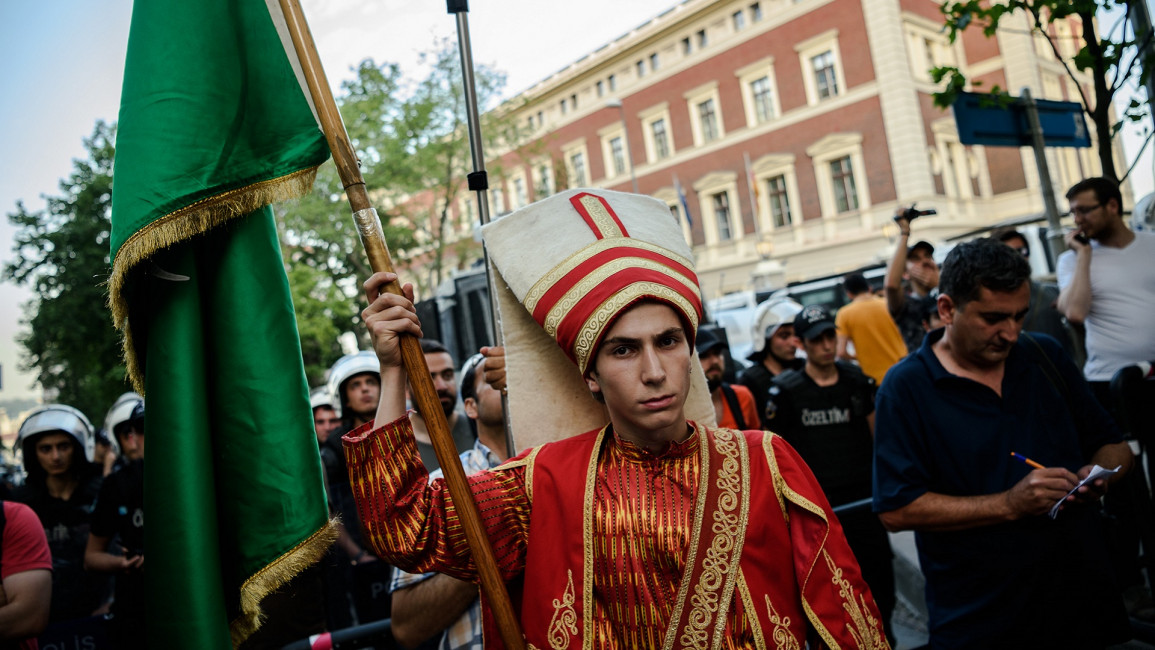
Turkey's 'New Neo-Ottomanism' buoyed by Mosul and Raqqa push
Erdogan's Turkey is pressing ahead with its intervention in northern Iraq, despite heavy resistance from Baghdad. Apart from security concerns and traditional geopolitical calculations, this could be motivated by renewed neo-Ottoman revanchism.
On Tuesday, Reuters reported Turkey's air force had been involved in coalition airstrikes on the Iraqi city of Mosul, part of the US-backed operation to flush out the Islamic State group.
Turkey has been locked in a row with Baghdad about the presence of its troops at a camp in northern Iraq and over who should take part in the assault on Mosul. The news of Turkish airstrikes in Iraqi territory will not be welcomed in Baghdad.
There is a raft of reasons why Turkey under the Islamist-leaning President Erdogan is keen to be part of the offensive on Mosul.
 |
Mosul is a majority Sunni Muslim city, and Turkey, a Sunni powerhouse, is keen to have a direct role to consolidate its Sunni leader status |  |
Sectarian geopolitics
Mosul is a majority Sunni Muslim city, and Turkey, a Sunni powerhouse, is both opposed to it being retaken by Shia-dominated Iraqi forces and militias; and keen to have a direct role to consolidate its status as a regional Sunni leader.
Turkey is also concerned about growing Kurdish power, a recurrent problem, given restless Kurdish separatist factions, such as the PKK, with whom Ankara has gone to war.
Even though it has good relations with Iraqi Kurds and their Peshmerga forces, Ankara will no doubt want to keep their influence in check, especially amid reports of ambitious Kurdish plans for claiming territory recovered from IS.
This is not to mention Turkey's investment in the "rights" of ethnic Turkmen both in Iraq and Syria.
 |
Strategic and security calculations regarding the containment of Kurds and IS are not the only thing motivating Turkey's passions in Mosul |  |
The Sultan has different ideas
Yet strategic and security calculations regarding the containment of Kurds and IS, the latter a source of major terror attacks inside Turkey, are not the only thing motivating Turkey's passions in Mosul.
Large parts of Iraq were once Ottoman territory, and Mosul and Kirkuk have been claimed as Turkish territory, most recently by President Erdogan himself.
Erdogan was not long ago accused of supporting a region-wide effort to thrust Sunni Islamists into power in former Ottoman territories, such as Syria and Egypt. As Islamists faced counter-revolutionary waves, however, that effort came crashing down, leaving Erdogan's neo-Ottoman dreams confined to silly appearances.
But the battle against IS, which Turkey was once accused of enabling, has arguably reinvigorated Erdogan's revisionist fantasies.
Turkey intervened directly against IS (and Syrian Kurds) in Syria last month and its proxies have now captured Dabiq from the jihadists.
| Read more: Apocalypse on hold - IS prophecy fails as Dabiq falls |
Dabiq is a highly symbolic town for IS but also for Turkey, whose Ottoman former rulers won a major history-altering victory against Arab forces in that very town, centuries earlier.
 |
We don't know whether Turkey will be part of the final push for the IS-capital of Raqqa in eastern Syria, as Turkish forces and proxies continue to push deeper into Syria |  |
Spheres of influence
We don't know whether Turkey will be part of the final push for the IS "capital", Raqqa in eastern Syria, as Turkish forces and proxies continue to push deeper.
More importantly, we don't know whether Turkey will ever withdraw. Plans to carve out a sphere of influence in areas of northern Syria that were once Ottoman-controlled may seem unlikely - but such a scenario is definitely on the cards.
In Iraq, the same dynamic is now playing out. The international coalition direly needs Turkish logistical assistance, and Erdogan has pounced on the opportunity to resurrect discredited territorial claims.
Erdogan could be going down this path also to boost his own power. Leaders facing internal crises - such as failed coup attempts and a backlash against subsequent purges - classically employ foreign adventures to reduce pressure as well as rally support.
Ultimately, it is unlikely Turkey will have any control on the ground regarding territory in Iraq - though it is possible Turkey's Syrian buffer zone is here to stay.
Ankara, however, does hold important cards in this high-stakes match, and that alone could be sufficient to demand a place at the table when the future of Mosul and adjacent territory is to be discussed, to be determined on a first-conquer-first-serve basis in our region's continuing free for all.
Follow Karim Traboulsi on Twitter: @kareemios
 |




